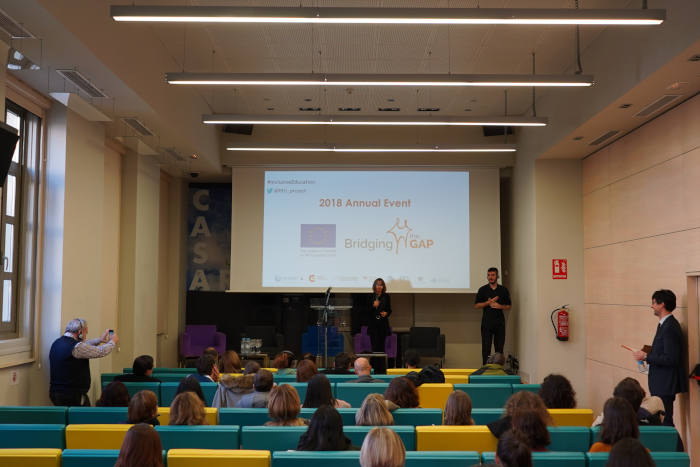-
03 December 2019
Category : Opinion
A painful exception
Journalist Vicky Bendito tells us about her personal experience marked by the challenges of being born with Treacher Collins syndrome
 Journalist Vicky Bendito tells us about her personal experience marked by the challenges of being born with Treacher Collins syndrome
Journalist Vicky Bendito tells us about her personal experience marked by the challenges of being born with Treacher Collins syndromeWhen my mother brought me into the world, the diagnosis they gave my parents was that I was “retarded”. I wonder what would have happened to me if they had gone along with that diagnosis, if I had not had a stimulating environment around me, if I had not been born in a European country.
I was born with Treacher Collins syndrome, a rare, disabling and incurable congenital craniofacial malformation that affects two out of every 100,000 people. Those of us who have this syndrome are born without cheekbones, with microtia (that is, without one or both ears), the jaw does not grow, we have a very narrow pharynx and, sometimes, we are also born with an open palate, which gives us a highly characteristic face and causes various problems – with our eyes (dryness and ulcers in the cornea), digestion (we cannot eat well), breathing (apnea) and hearing (deafness), among others.
After they recovered from the initial shock of the diagnosis, my parents were clear that they had to make me an independent person. They took me to a special education school, where they gave me my first hearing aid and a lot of speech therapy classes and taught me how to lip read. By the time I was eight or nine years old, I was going to an ordinary school where I passed my exams with a little luck, but without any special technical support beyond my retroauricular hearing aid and sitting in the front row to better hear the teachers.
I remember my childhood as being happy, with my siblings, friends, summers in the mountains, cousins, a horrible adolescence, after which a relatively satisfactory stage arrived. There have been two clearly distinct phases in my life: one in which what weighed most heavily on me was my face, that physiognomy that I felt comfortable with when I looked in the mirror but that caused rejection as it did not comply with the imposed ideas of beauty, and, another, in which what weighed most heavily was my disability.
The first occurred when I was a teenager, the second became apparent when I joined the world of work. Who in their right mind, having been born deaf, would think of becoming a journalist? Me! I have been working for 25 years now, 20 as a journalist for a news agency and five in the communications department of a large company that has inclusive employment as one of its principles.
During these years I have become aware of how ahead of their time my parents were, because I was born at a time when people with disabilities were considered a family misfortune and a drag on society (invalid, deformed, useless, abnormal or deficient are some of the nouns with which they referred to us). Throughout these years, I have been aware of how lucky I was to be born in a European country, and how unfair it is that your life is so different because you have a condition that you have not chosen and you live in a certain place.
For me, the determination of my parents was essential to me becoming the woman I am. Someone recently told me about the case of a deaf woman who was almost 30 years old, who uses hearing aids, but hears very little and who has been so overprotected all her life that she did not go to university, nor did she learn sign language, she has an unskilled job and does not know how to do anything without her family. She is much younger than me, a daughter of democracy, European, born in a society that has been changing its views about disability, where there are laws that have been passed throughout our history for our rights. She had factors favouring her personal development, but her family, that fundamental pillar in the development of any child, but especially those with disabilities, has made her incapable. It is not the only case that I have heard about. And it hurts. It hurts that these things continue to happen in European countries, and if they are happening in Europe, what must be happening in less developed countries?
Some 15% of the world’s population has a disability, more than 80% are poor, 50% of people with disabilities do not have access to health care, a very small percentage work (it varies from one country to another), and I won’t even go into whether they have a job with a decent salary or not. The vast majority of the more than 1 billion people with disabilities in the world live in developing countries.
Disability is a condition that we did not choose to have, it is a condition that is a factor in impoverishment, discrimination and inequality throughout the world because, even in the most advanced countries there are many barriers, the biggest being the lack of accessibility, which prevent our inclusion, our participation in society as full citizens.
I have a disability, I have an independent life, I have been able to study and I continue to do so, I work in the profession I chose, I have access to health care … but I am the exception, not the rule. A painful and embarrassing exception difficult to understand. And when I take a look at the statistics, I can’t help wondering what would have happened to me if my parents had settled for that unfortunate first diagnosis, that “your daughter is retarded”.
The views and opinions expressed in this blog are the sole responsibility of the person who write them.






